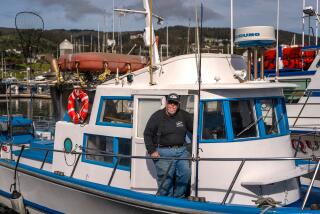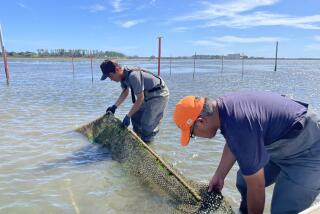Fishermen, Exxon Weigh Oil Spill Costs
- Share via
VALDEZ, Alaska — For half an hour Sunday, the people likely to feel the first big financial setbacks of the largest oil spill in U.S. history faced the people most likely to pay for it.
In the sunlit lounge of the Westmark Hotel, fishermen began to talk claims with Exxon, which has taken “full financial responsibility” for the massive oil spill from its ship in Prince William Sound.
There was no clear-cut resolution. “Both sides were dancing,” said Sandy Cesarini, co-owner of SeaHawk Seafood Inc., a major seafood processor in Valdez. “We’re talking about potential devastation for the next 15 years. It’s not like having an accident and replacing a car.”
“Are they going to have somebody working with us over the long term, or do we have to go looking them up all the time?” asked Jack Lamb, acting president of the Cordova District Fishermen United, the fishermen’s group representing Valdez.
Cash Flow Concerns
Fishermen here are also concerned with immediate cash flow. The fishing season is about to begin, and if the spill interferes, the fishermen want to know whether Exxon will work out quick compensation.
At this point the men from Exxon will only reaffirm that the company will compensate any verified claims. The company said it would only settle these claims with individuals, not fishermen’s groups, and without the intercession of attorneys.
Adversity and living with competing interests is a part of Valdez’s history. The town was wracked by a monster earthquake on Good Friday 25 years ago, and now “our realization of this disaster grows by the hour,” said Valdez Mayor Dr. John Devens.
But no one wants to end relations with the city’s biggest taxpayer, Alyeska Pipeline Service Co., which runs the Valdez terminal. “You can’t disrupt a single element without disrupting the region’s economy as a whole--it all fits together,” Devens said.
“The oil has been good to us,” said Dave Johnson, owner of the town’s three taxis. Still, he is politely worried. “It’s just that we want a safety factor.”
No-Nonsense Town
Valdez, pronounced Val-deez for reasons lost in the rough and tumble of the Alaska gold rush, is a no-nonsense town of 3,600 fishermen, canners and locals who charter boats and planes to summer tourists. Plain, sturdy hotels and filling stations are surrounded by the snowy, dark crags of the Chugach Mountains, and the once deep green waters of Prince William Sound.
Northern Lights are a common sight. The town’s mascot, Otto or Oscar, depending upon your informant, is a sea otter who adopted the place five years ago. And far from being the company town outsiders expect, it remains in its own mind a fishing village, which is why so many here are worried.
“I would bet if I had to that the herring pound fishery won’t happen, and that’s a $5-million whack to the fishermen right there,” said Rick Steiner, assistant professor in the University of Alaska Marine Fisheries Advisory Program.
The first event of consequence in the $100-million fishing industry here is the herring roe catch, also called herring pound fishing. An expensive delicacy in the Japanese market, the eggs are collected both from fish caught in purse-seine nets and from kelp hung by local fishermen, to which it becomes attached after spawning. In the 15 years or so since the Japanese market developed, Alaskan fishermen have come to depend on this early-season cash.
“Spring money,” Johnson calls it. “It helps give them that first shot of money that they need for nets and so forth, for the salmon run. It’s been a long winter, and they need that money.”
Fishermen were given some small hope when Exxon announced Sunday that it was “cautiously optimistic” about results of a test burning of 15,000 gallons of the spill. Burning the spill away is a far more attractive proposition than the more likely alternative, which is using additives that break up the oil and sink it to the bottom. The harm to fisheries if this method is adopted is being studied, but fishermen are angry at the prospect.
More to Read
Sign up for Essential California
The most important California stories and recommendations in your inbox every morning.
You may occasionally receive promotional content from the Los Angeles Times.













